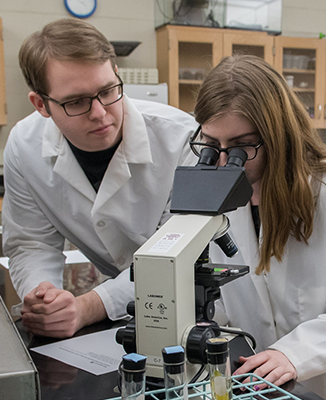Engineering B.S. (Biomedical concentration)
The Bachelor of Science in Engineering with a Biomedical Engineering concentration emphasizes the combination of biomechanics and manufacturing of biomedical devices.
The concentration prepares students to contribute to the design and improvement of major health-related devices like artificial hearts and prostheses, health management and care delivery systems, magnetic resonance imaging (MRI), and devices for automating insulin injections or controlling body functions.
With the 4+1 integrated degree program, students can go on to earn an M.S. in Engineering Management with only one additional year of study. Graduates who earn a 3.5 GPA or higher and apply to the Biomedical Engineering graduate program at Carnegie Mellon University are eligible for a special streamlined application process and waived application fee.
The Bachelor of Science in Engineering is accredited by the Engineering Accreditation Commission of ABET, https://www.abet.org.

Contact Information
Won Joo, Ph.D.
Department Head, Engineering
joo@rmu.edu
412-397-4026 phone
Rika W. Carlsen, Ph.D.
Coordinator, Biomedical Engineering
Director, Center of Outreach and Innovation
carlsen@rmu.edu
412-397-3531 phone
- 4-Year Course Plan
-
Freshman Year, Fall
- Intro to Engineering
- Calculus w/Analytic Geometry I
- Chemistry I with lab
- Programming
- Intercultural Communication/Reading & Writing Strategies
Freshman Year, Spring
- Engineering Graphics
- Calculus w/Analytic Geometry II
- General Physics I with lab
- General Physics I with lab
- Fundamentals of Accounting
Sophomore Year, Fall
- Statics & Strength of Materials
- General Physics II with lab
- Calculus w/ Analytic Geometry III or similar
- Anatomy & Physiology I with lab
Sophomore Year, Spring
- Biomedical Engineering Principles
- Circuits & Electromagnetics
- Thermodynamics & Energetics
- Differential Equations
- Anatomy & Physiology II with lab or Chemistry II with lab
Junior Year, Fall
- Engineering Materials
- Dynamics
- Fluid Mechanics
- Survey of Economics
- Professional Communication in Workplace
Junior Year, Spring
- Value Design
- Biomedical Engineering Elective
- Management Theory & Practice
- Biomechanics
- Contemporary American Social Problems or similar
Senior Year, Fall
- Engineering Practice
- Biomedical Engineering Elective
- Public Speaking & Persuasion
- Humanities: Art & Music
- World Literature or similar
Senior Year, Spring
- Integrated Engineering Design
- Biomedical Devices & Systems
- Principles of Marketing
- General Psychology
- US History 1 or similar
- Additional Program Details
-
Program Educational Objectives
Five years after graduation, RMU engineering graduates should:
- Be technically competent engineers.
- Be hands-on practitioners of engineering.
- Possess strong understanding of business and, strong team and communications skills.
- Be well-prepared to embrace the continuous learning necessary to practice engineering over their entire professional lifetimes.
- Have a strong understanding of engineering ethics.
Student Outcomes
Until 2018-2019 Academic year.
At the time of graduation, the graduate should have:
- an ability to apply knowledge of mathematics, science, and engineering.
- an ability to design and conduct experiments, as well as to analyze and interpret data.
- an ability to design a system, component, or process to meet desired needs within realistic constraints such as economic, environmental, social, political, ethical, health and safety, manufacturability, and sustainability.
- an ability to function on multi-disciplinary teams.
- an ability to identify, formulate, and solve engineering problems.
- an understanding of professional and ethical responsibility.
- an ability to communicate effectively.
- the broad education necessary to understand the impact of engineering solutions in a global, economic, environmental, and societal context.
- recognition of the need for, and an ability to engage in life-long learning.
- knowledge of contemporary issues.
- an ability to use the techniques, skills, and modern engineering tools necessary for engineering practice.
From 2019-2020 Academic Year to Present
At the time of graduation, the graduate should have:
- an ability to identify, formulate, and solve complex engineering problems by applying principles of engineering, science, and mathematics
- an ability to apply engineering design to produce solutions that meet specified needs with consideration of public health, safety, and welfare, as well as global, cultural, social, environmental, and economic factors
- an ability to communicate effectively with a range of audiences
- an ability to recognize ethical and professional responsibilities in engineering situations and make informed judgments, which must consider the impact of engineering solutions in global, economic, environmental, and societal contexts
- an ability to function effectively on a team whose members together provide leadership, create a collaborative and inclusive environment, establish goals, plan tasks, and meet objectives
- an ability to develop and conduct appropriate experimentation, analyze and interpret data, and use engineering judgment to draw conclusions
- an ability to acquire and apply new knowledge as needed, using appropriate learning strategies
Enrollment and Graduation Data (B.S. Engineering)
- 2022-2023: 57 new admission, 225 enrolled, 62 graduated
- 2021-2022: 56 new admission, 248 enrolled, 63 graduated
- 2020-2021: 42 new admission, 275 enrolled, 74 graduated
- 2019-2020: 78 new admission, 318 enrolled, 87 graduated
- 2018-2019: 80 new admission, 349 enrolled, 99 graduated
- 2017-2018: 94 new admission, 359 enrolled, 149 graduated
- 2016-2017: 102 new admission, 532 enrolled, 138 graduated
Sample Courses:
These are some of the classes for students in this academic program:
Top Employers

Call us at:
1-800-762-0097
School of Engineering and Science
The School of Engineering and Science offers robust programs that prepare students for innovative careers in engineering and science.
Visit School Site
